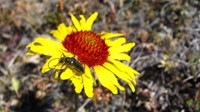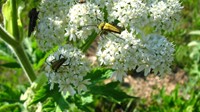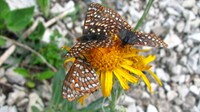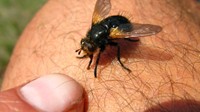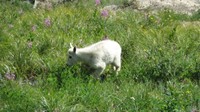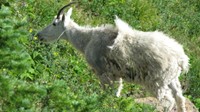What does it mean to be human?
When I got to the top of one of Colorado’s 14,000+ peaks, I encountered a few mountaineers who arrived at the same time. Upon reaching the summit, one climber pulled out his cell phone and placed the all-important victory call. He started yapping so loudly, that I couldn’t help but think of this funny 60 second MP3.
Why backpack?
When you ask a thru-hiker, “Why do you backpack for six months?”
Many will give you a vague answer like, “To reconnect with nature,” or “To see where I fit in nature,” or “To understand our relationship with the universe.”
That's nice. But what the hell does that all mean? And have you ever noticed that few will give you a solid answer to those tantalizing philosophical concepts?
With a few thousand miles behind me, I have some ideas. My answers will shock you.
Are humans part of nature?
So where do humans fit in nature anyway?
Listening to the way some people talk about our species, you might get the impression we are not part of nature. People say that humans transform the “natural” environment. We build dams, hunt animals to extinction, and pollute the air with our factories and farts.
The technology we create is “artificial” and we wear “synthetic” fabrics. We eat “processed” foods and drive Hummers, Priuses, and golf carts.
Conventional wisdom draws a line between the “natural world” and the world of humans. The accepted equation is:
In short, we’re an ugly foreign species that have invaded planet Earth. Some argue that we have done nothing but nasty things to rip apart the “natural ecosystem” that had been in beautiful “balance” before we came along. The human species is nature’s worst enemy.
Is this view correct?
I expect by year-end I will have backpacked over 11,200 miles in the last seven years. I’ve spent many moons sleeping under the stars, climbing mountain ranges, and observing the wilderness. I’ve been in the great outdoors more often than all the producers of “National Geographic.” And I completely disagree with the conventional view of our species.
On the contrary, humans (and everything we create and do) are as natural as a daisy growing in a meadow, as rain eroding a mountainside, and as an asteroid blasting our planet.
Of course, if an alien landed on our planet, it would conclude that our species has some unique characteristics. We’re bipedal, we’ve got big brains, and we love reality TV shows.
However, the alien would ultimately clump us in with the rest of the biota of this planet. We’re simply another living thing that is doing our best, as a species, to reproduce to the maximum extent we can get away with. And, like any other species, we’ll do whatever it takes to achieve this end, including lying about our age and income.
Is that evil? Is that wrong? No, it’s just what life does.
Do we have free will?
As individuals yes, but as a species, not really. As a species, we do what every species does: utilize every power we have to maximize the propagation of our DNA. That programming runs deep. Some think that since we’re sentient, we ought to rise above our base genetic programming and behave in a more “enlightened” way. However, it’s a bit crazy to believe that our brains, which are only 100,000 years old, would be capable of overriding three billion years of programming. Of course, individuals can do this, but as a species, we can’t.
Every living thing, whether it is e. Coli, carrots, or a silver-backed gorilla, all want to spread their genes as far and as densely as the ecosystem will allow.
- Why are there not a trillion gorillas? The ecosystem can’t sustain that population.
- Why are there a billion carrots worldwide? Because humans have modified the environment to help them thrive.
- Why are there over a trillion strands of e. coli? Because there’s plenty of space and nutrients for them, especially at McDonald's.
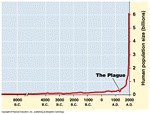 All three examples show that a species keeps reproducing until it hits a population wall. Our job, like any species, is to keep reproducing and spreading until we hit that wall. Perhaps that wall is 20 billion humans on the planet (we’re seven billion now).
All three examples show that a species keeps reproducing until it hits a population wall. Our job, like any species, is to keep reproducing and spreading until we hit that wall. Perhaps that wall is 20 billion humans on the planet (we’re seven billion now).
Every year we’ll try to move that wall back so we can squeeze a few more on the planet. In the last 50 years, for example, global farm production has tripled while land under production increased by only 10%. We’ll keep getting more efficient to pack more people around the globe. If that means using nanotechnology to fight diseases, desalinizing the ocean, or planting more trees, then we’ll do it. We’ll keep doing whatever it takes until we hit a new wall. Perhaps someday we can squeeze 650 billion humans on this floating rock. Hard to believe, but I certainly see a lot of empty real estate on the Continental Divide…
Think about beavers
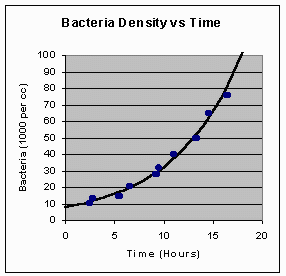 Some people think humans have an “unfair advantage” over all other animals because of our brains and so we should scale back our actions to fit more nicely in the “natural world.” Let’s consider that argument …
Some people think humans have an “unfair advantage” over all other animals because of our brains and so we should scale back our actions to fit more nicely in the “natural world.” Let’s consider that argument …
When I’m hiking the CDT, I have little interest in getting “beaver fever.” Beavers poop next to their dams and I get the water downstream. Then I enjoy a waterborne disease and the associated frequent trips to the toilet. Notice the beaver couldn’t care less of the environmental impact its actions are having on humans (and other species).
Before the Europeans arrived in America, about 125 million beavers were running around. How many beavers would there have been if the beavers didn’t use their full mental and physical talents? Imagine if they held back and had to rely on “natural” dams that occur in forests. There certainly wouldn’t be 125 million beavers. Is fully utilizing all their talents “unnatural”? On the contrary, not fully utilizing all our talents is unnatural! Just ask Dolly Parton.
Once the Europeans started trapping beavers, invading their environments and disrupting their dams, the beaver population dropped 90%. Today there are about 12 million beavers. Why not more? Because that’s the maximum that the ecosystem can sustain. Humans are part of that ecosystem and we’re limiting their growth, just like cats limit the growth of mice.
Let’s imagine that humans had never existed and that beavers expanded into the billions. Let’s say the beavers dammed every stream on the planet, thereby altering the geography and ecosystems throughout the world. Would observers call those changes “unnatural” or “artificial”? Would the beavers have knocked the earth “out of balance”? Wouldn’t the planet adjust accordingly, just like it did when the Rocky Mountains rose toward the sky, disrupting aquatic ecosystems that buried it?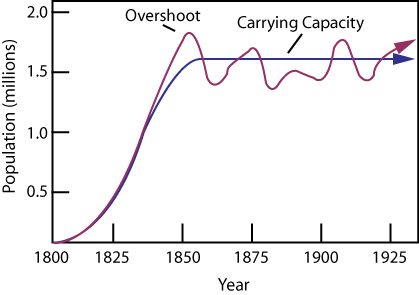
Humans are like beavers on steroids. We’re not all that different from one another. If one agrees that beavers are part of nature and accept their natural behavior, then why not agree that humans and our actions are also part of the natural environment?
Reproduce to the carrying capacity
I love to ask myself odd questions when I’m walking in the CDT. Why are blades of grass so tightly packed? Why aren’t they thinly spread out like trees in alpine terrain? Why aren’t trees in alpine terrain packed like blades of grass? The answer is always the same: that’s the maximum the environment can sustain.
It's what is called the carrying capacity. The carrying capacity is never stable forever (because the environment is never static), so that graph on the right is a bit misleading. However, all populations indeed grow to meet that carrying capacity.
How many strawberries, corn, and chickens would exist in the world if humans weren’t around? We’re doing those species a favor by modifying the ecosystem so that they reproduce more than if we weren't helping out. We’re farming them just like leaf cutter ants that I saw in Costa Rica that farm fungi. The fungus the ants grow, like the mangos that humans grow, benefit from the natural behavior of ants. The citrus trees whose leaves are harvested end up losing, just like all the species we annihilate to make room for fields of corn. Leafcutter ants deforest massive numbers of trees (see video below). Indeed, humans aren’t that different from leafcutter ants; we just cut down more trees. There are species of ants that herd aphids, in much the same way humans herd cattle, and those ants live off the sugary excretions of the aphids. Other species farm too. All these farmers are as natural as Willie Nelson’s hair.
OK, so we help some species, but doesn’t the quality of life for these species that we help suck? We grow plants and animals in confined environments, packed like sardines. It's cruel, but all species that farm does this. If you don’t like it, become a vegan like me. You’ll only be abusing plants.
Moreover, all species continue to reproduce if there are enough resources to sustain them. If they could, deer would reproduce to the point that they would be living on top of each other. That’s what bacteria do. They live on top of each other because they can. So do New Yorkers.
But aren’t we “artificially” helping some species with our tractors and pesticides? A tractor and pesticides are as natural as the stick a chimp uses to access a hole full of ants; they’re tools that we fashion to help make life better.
The purpose of humans isn’t to make broccoli thrive, but we do. Nor was the purpose of humans to make the Neanderthals go extinct, but we did. Our purpose is simply to do every other living thing does: use all our powers to reproduce to the maximum capacity the environment can sustain.
But what about “invasive” species?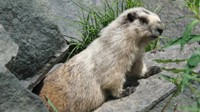
Biologists like to talk about “invasive” species that take over an ecosystem. They’ll refer to some plants on the CDT as “not native.” They love to blame humans for introducing “non-native” species into ecosystems and destroying the “natural” environment.
Folks who believe such things have a narrow perspective. What about the flea that hitches a ride across the continent on a horse and gets introduced into a new environment? What about the birds that carry microscopic fish eggs on their feet? What about the fact that life on this planet may have come from another planet? Does that then make all live on this earth an “invasive species”?
Life invades new ecosystems anyway it can. Get over it.
There’s nothing “unnatural” about humans introducing (or genetically modifying) a species to make our lives better. We introduced horses in the Americas and the Native Americans introduced corn and potatoes to Europe. Bees introduce pollen to new pastures and hippos introduce birds to new environments in Africa. Nor is it unnatural for humans to accidentally (or purposely) introduce species that do us harm; other animals do this all the time too. Life, like a thru-hiker without food, likes to hitch a free ride.
I’ve camped next to frozen alpine lakes in Colorado and seen wildflowers fighting to peek through the snow that has buried them all winter. This delicate wildflower “invaded” this alpine region at some point. Indeed, as my last email mentioned, the continental divide was hardly a mountain range millions of years ago; instead, it was a massive canal teeming with fish.
Genetic modification is natural too
If bears could genetically modify or breed berries that are 10 times bigger than the current ones, they would do it.
If a coyote had a brain like ours, don’t you think it would develop wire clippers, traps, and machine guns to take out sheep and other prey?
All the animals push their abilities to their maximum potential; we’re no different. The pressures of the environment constantly help select for even more successful attributes. What's success? The more you spread your DNA, the more successful you are.
In conclusion, humans are not outside of nature. We’re part of nature and our actions are as natural as a fly landing on a cow pie. We’re doing what living things do. Sure, we have big brains, nice cars, and iPhones, but we’re just doing what any species wants to do: spread far and wide. We’ll alter the environment to make it better for our genes. We’ll help other species that help us achieve that end (plants and some animals). We’ll kill species that get in our way. At times we’ll unwisely alter an ecosystem, but after paying the price, we adjust. That’s what all life does.
We expect that because we’re sentient that we should behave differently than an amoeba. However, how can we deny three billion years of evolution? The urge to reproduce to the maximum extent is so embedded in our minds that we don't have a choice but to follow it. Individuals can resist, but the human race can’t.
But isn’t the environmental havoc we’re causing unnaturally fast?
Not compared to the “natural” asteroid that pummeled our planet 65 million years ago. The day it hit, more changes happened than all the changes humans have caused in the last 3 million years. Earth has sustained far more devastating disasters than what we’re doing lately.
Nevertheless, we are having a dramatic impact on the planet. We’re certainly causing more change than all the beavers of the world. However, the impact is not “artificial.” It’s just a byproduct of what our species is doing to spread its DNA.
It’s also not happening “unusually fast.” It’s going at nature’s speed. We’re part of nature and we’re using all our powers to reproduce and spread our DNA as fast as possible. Volcanoes, tsunamis, earthquakes, and meteors produce changes far faster than whatever we can do (unless we use nuclear bombs). Also, we’re not “cheating” just because we have a three-pound brain with billions of neurons, just as a cheetah isn’t “cheating” by using its gift of speed to catch an impala. The rules of life are simple: use what you have as best as you can or die. 
But we’re losing so much species diversity!
Yup. But our species is still growing exponentially, and that’s all that matters to our DNA. It’s hard to take over the world without breaking a few eggs.
If the polar bear had the technology to cause massive global freezing, do you think it would care about the thousands of species that would go extinct when the Amazon freezes over? The polar bear species would be glad to pay that environmental price if that meant that it could expand its reach a thousandfold.
Again, why backpack?
Like other backpackers, I too like to “reconnect with nature,” and “to see where I fit in nature,” and “to understand my relationship with the universe.”
Whereas some outdoorsy types don’t explain what all those statements mean, I’ve tried to do so in this article. My answers are unconventional and even controversial compared to the typical tree-hugging backpacker who sees humans as an evil virus that is destroying the planet. I don’t celebrate our actions, nor do I lament it. I just accept that what’s happening is natural and that life and change will continue relentlessly. It’s an unorthodox viewpoint that probably comes from my unorthodox way of life.
While I try to leave no trace when I backpack, I accept that life usually doesn’t do that. Life always tries to leave a trace. It tries, desperately, to leave its DNA everywhere it goes. I see it in every valley and mountain top I hike to.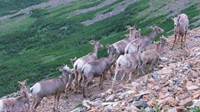
As my previous article showed, the timeline of our planet is longer than we can imagine. Our species is just a blip in the timeline and we’re doing what every species before us did, including thinking that we’re really special.
So what does this mean?
Let’s say you’re crazy enough to understand what I’m saying and that you (gasp!) even agree with me. What do you do?
I live a low impact way of life and I encourage others to do the same. I value the ecosystem the way it is, although I recognize that it will change just like it always has. I don’t despair. I accept and do my part to minimize my impact on the planet. I don’t expect others to do it. If they have financial incentives, then they might change. Enjoy the planet the way it is now and realize that it will continue to change.
To read reactions to this article (and write your own), visit my WanderLearn Forum. You may also enjoy this article about what other species have over 7 billion individuals.
